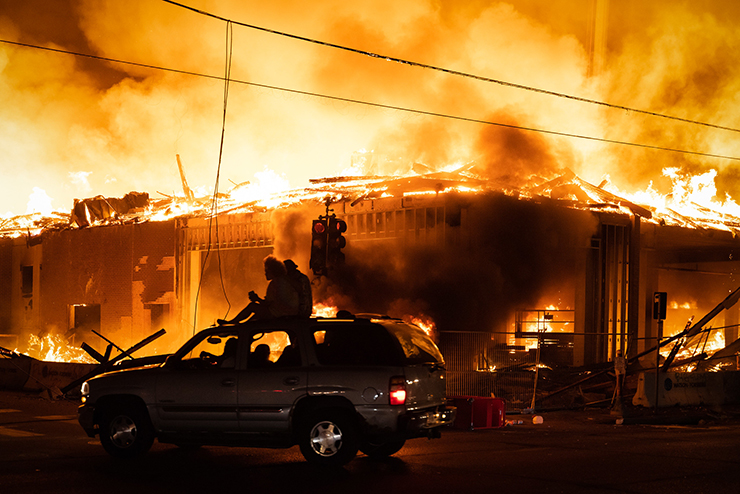November has been a strange month for justice.
On Nov. 13 the U.S. Army announced it would overturn the convictions of 110 black soldiers who participated in a bloody mutiny in Houston in 1917. Although historical accounts of the event vary, several civilians and police officers were killed after the revolt by a black regiment known as the Buffalo Soldiers. A few days after that momentous announcement, the United States Supreme Court rejected Derek Chauvin’s appeal of his conviction for the killing of George Floyd.
Chauvin’s lawyers argued that in 2021 he had been denied a fair trial in the District Court of Minnesota because of public pressure to convict him. Floyd’s death in 2020 had triggered widespread rioting in Minneapolis and the burning down of the city’s 3rd Precinct police headquarters; the specter of renewed violence loomed over the possibility of an acquittal.
Four days after getting the cold shoulder from the Court, the Associated Press reported that Chauvin was stabbed by another inmate. He was seriously wounded but is currently in stable condition.
Race, of course, has shaped the way both stories have been told.
Media reports about the clemency granted to the black soldiers highlight the racism and discrimination they experienced before the Buffalo Soldiers mutiny. Here is the Associated Press line: “Clashes arose between the regiment and white police officers and civilians.”
That is obviously not the full story.
It is true racial tensions and discrimination played a part in the lead-up to that mutiny, however, police officers didn’t kill anyone before the rioting started, and the casualties the soldiers incurred were self-inflicted—including incidents of friendly fire and suicide after the fact. Meanwhile, the soldiers apparently indiscriminately shot at buildings and homes and cars driven by whites, according to records collected by the South Texas College of Law Houston. They also murdered Captain Joseph Mattes of the Illinois National Guard because they mistook him for a cop. “In their two-hour march on the city, the mutinous Blacks killed fifteen Whites, including four policemen, and seriously wounded twelve others, one of whom, a policeman, subsequently died,” wrote Professor Robert V. Haynes.
In other words, the black soldiers responded to the injustice they suffered with a far worse injustice, which backfired.
In the end, 110 were convicted, 63 were given life imprisonment, and 19 were hanged just outside San Antonio. President Woodrow Wilson commuted the death sentences of 10 soldiers. In a public statement, Wilson said he decided to grant them clemency “for the reason that, while deeply engaged in this riotous mutiny, the men involved are not shown by the record personally and directly to have caused the death of designated individuals.”
So the Houston mutineers have now received clemency, twice. Meanwhile, Chauvin may die in prison because he cannot even get a hearing for an appeal, even though his lawyers are certainly correct about how the public pressure poisoned the Minnesota District Court’s objectivity.
Floyd’s death triggered the most destructive riots in recent American history. There was a palpable threat of more violence in the event of an acquittal. Indeed, according to court documents reviewed by Alpha News, attorneys felt pressured to bring down the hammer. Several are on record as having opposed going after the other officers implicated in Floyd’s death and withdrew, citing “professional and ethical” concerns.
During a June 2020 deposition, Patrick Lofton, senior assistant Hennepin County attorney, said there “was extreme pressure” to file charges. “The city was burning down,” he said. Lofton noted in his deposition that while he believed Chauvin could face charges, the outside pressure was “insane” and he did not feel good about charging the three other cops involved in Floyd’s arrest.
Lofton was one of the attorneys who withdrew from the case. He was joined by Amy Sweasy, then one of the office’s top prosecutors, who revealed in her own deposition eyebrow-raising comments from Hennepin County Medical Examiner Dr. Andrew Baker about Floyd’s autopsy.
“He called me later in the day on that Tuesday and he told me that there were no medical findings that showed any injury to the vital structures of Mr. Floyd’s neck,” Sweasy said, according to the transcript of her deposition. “There were no medical indications of asphyxia or strangulation.”
“He said to me, ‘Amy, what happens when the actual evidence doesn’t match up with the public narrative that everyone’s already decided on?’ And then he said, ‘This is the kind of case that ends careers.’”
Despite his private misgivings, at Chauvin’s trial, Baker said heart disease and drug use were “contributing causes,” but “not direct causes” of Floyd’s death. “I would still classify it as a homicide today,” he said.
The real question is whether Baker really believed in what he testified, or whether his testimony was influenced by the impending destruction that awaited outside the courthouse if Chauvin were to be found not guilty.
There is an alleged Chinese curse that goes: “May you live in interesting times.” Those times have arrived, and they are marked by an arrangement where the living and dead are judged to be good or evil, redeemable or lost, guilty or innocent on the basis of race.

Leave a Reply